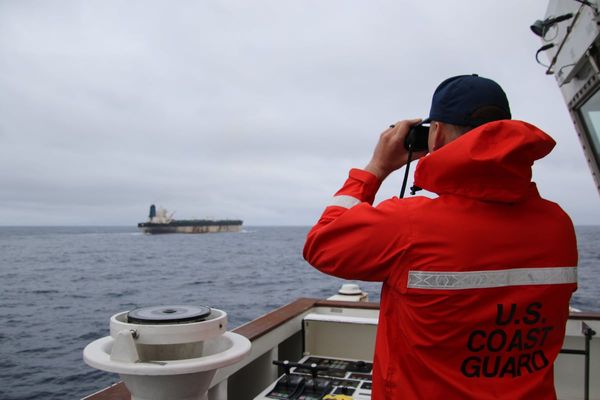
Good morning. Rachel Reeves has gone to Washington for the annual meetings of the International Monetary Fund (IMF) – but the main audience for her public comments this week has been the one back at home.
Ahead of what is certain to be a tough budget next month, the chancellor has sought to prepare people for the prospect of tax rises and spending cuts, and pin the blame for both on the Conservatives. With the threat of Reform in mind, she has also pointed to the aftermath of Brexit. And yesterday, in an interview with the Guardian’s Heather Stewart, she insisted that the package would not amount to a return to austerity, adding that higher taxes on the wealthy “will be part of the story”.
“I’m being honest and I think the British people respect that,” she said – but whether public respect will be the dominant mood when the budget is announced is not yet clear. For today’s newsletter, I spoke to Heather Stewart about how the chancellor has laid the groundwork – and what her PR strategy suggests she might do next. Here are the headlines.
Five big stories
Espionage | Three witness statements were released by Keir Starmer on Wednesday night in an effort to draw a line under a row over the collapse of a case against two Britons accused of spying for China. They showed the UK’s deputy national security adviser saying that Beijing’s intelligence agencies “harm the interests and security of the UK”.
Gaza | Hamas has announced that the remains of all the deceased Israeli hostages that it can reach have been handed back and it would need specialist recovery equipment to retrieve the rest from Gaza’s ruins. 19 of 28 hostages known to have died have not been returned.
Climate crisis | Levels of carbon dioxide in the atmosphere soared by a record amount in 2024 to hit another high, UN data shows, deepening the climate crisis that is already taking lives and livelihoods across the world.
Immigration | A larger proportion of people who frequently watch GB News wrongly believe that net migration to the UK is increasing than those of other major channels, according to a study examining public attitudes to broadcasting impartiality.
Titan submarine | The deadly implosion of a submersible traveling to the wreck of the Titanic was the result of faulty engineering, according to a US report released on Wednesday. The National Transportation Safety Board said that the Titan’s owners did not adequately test the experimental submersible before the trip.
In depth: ‘It won’t be easy with people feeling that the cost of living crisis never ended’
In her interview with Heather last night, Rachel Reeves suggested that the public would be sympathetic to her plight. “I think people can see that this year, in 2025, the world’s been a very, very volatile place,” she said.
That’s probably true, as far as it goes – but it also feels like an attempt to brush past one of her fundamental problems: after last year’s budget, she said that “we did wipe the slate clean to put public finances and public services on a firm footing, and as a result, we won’t have to do a budget like this ever again.”
Her message to a wider audience at the IMF summit has been that the UK is a “beacon of economic stability”. But an IMF report has painted a dim picture of the global economic outlook and warns of worsening inflation in the UK, with only limited consolation in a slight improvement to the growth forecast. “They want to present what they’re doing as pro-growth,” Heather said. “But that won’t be easy with people sitting at home who feel that the cost of living crisis never ended.”
***
The backdrop | Pain on productivity
While the IMF report is important, and a portion of the hole in Reeves’ plans might have been filled by proposed cuts that caused a backbench rebellion earlier this year, the biggest problem facing the chancellor is a shift in projections from the Office for Budget Responsibility (OBR).
The issue is that after years of its forecast overestimating the UK’s productivity, the watchdog has decided to adjust its model, thereby producing a more pessimistic figure. That is not the result of anything this government has done, but a more realistic view of the trend in the UK since the financial crisis.
“They’ve waited and waited to do it,” Heather said. “The Treasury privately say they could have done this in 2023, which would have made Jeremy Hunt’s pre-election national insurance cuts look unaffordable – and we’d be in a totally different world.” Indeed, Reeves told her yesterday: “I think that it would have been a lot better if they had adjusted their forecasts the year before the election, or even last summer, to enable the new government to really understand the economic position.”
But that kind of explanation is not likely to cut through – and, Heather said, “it does underline that it was probably a mistake for Reeves to make tax rises last year and tell everyone that it was ‘one and done’. There was always a risk of this happening.”
***
The consequences | Tiny shifts, big costs
As a result of the OBR’s new forecasting model, Rachel Reeves’s tiny fiscal headroom is all but certain to be erased. The Treasury has now decided that it needs a much more comfortable buffer – perhaps as much as £20bn, compared with £10bn last year – which inevitably points to more unpalatable news at the budget. “They don’t want to be in this position where small changes in the forecast put you on the wrong side of the line,” Heather said.
Partly, that is about meeting the government’s self-imposed fiscal rules. (This First Edition on why these constraints are so controversial remains an evergreen explainer.) But the bigger picture is about the bond market, and trying to make sure that its participants view British government debt as a sound investment. (See Heather’s September analysis for more on this.)
“I would like it not to be true, but we borrow an awful lot of money, and tiny differences in confidence make a big difference to what we spend on interest alone,” Heather said. Greater headroom might make Reeves more comfortable about defying the will of the market in the future – but it comes at a heavy price.
***
Tax rises | No shift on manifesto pledges
Reeves remains straitjacketed by Labour’s decision to rule out tax increases for “working people” – meaning no rises in income tax, VAT, or employees’ national insurance contributions. Even with the bleak outlook for the public finances, Reeves views breaking the manifesto commitment as an unacceptable political risk.
Not budging on those manifesto commitments, says Heather, is “partly because they want to be able to talk about what they’re doing on the cost of living, and that suddenly would become very hard to do”.
There have also been calls from Labour MPs to scrap council tax and replace it with a new system that better reflects the sharp rise in property values in London and the south-east over the last 15 years. That would be a sensible move in principle, Heather said, “but it would be a bombshell to do it. I can’t tell you it’s 100% off the agenda, but it’s not top of the list at the moment.”
That leaves tax rises that weren’t ruled out in the manifesto – like levying national insurance on landlords’ rental income and on partners in law firms and consultancies, inheritance tax reforms, new bank levies and gambling taxes. Without flagging any specific measure, Reeves said yesterday that taxes on the wealthy would be part of the package.
It would be possible to cobble together a significant sum through these sorts of taxes, and “a lot of them are progressive things to do that can make the system work better”, Heather said. “But it’s always going to be true that it’s difficult, because the manifesto pledges represent 75% of tax revenue.”
***
Spending cuts | Back on the table as outlook worsens
The biggest news out of Reeves’s round of interviews was her confirmation that spending cuts are on the table. “Not long ago, the mood music from the Treasury was, ‘We’ve done a spending review and we don’t need to look at that,’” Heather said. “Evidently that’s changed.”
The government’s U-turns on the welfare bill and pensioners’ winter fuel payments are an illustration of how politically difficult cuts will be – and the broad sense among Labour MPs and voters is that the legacy of 15 years of Conservative-led government is still so deeply felt in public services that there is no fat available to trim.
There is also a risk of undermining Labour’s “no return to austerity” message. And, as Richard Partington set out in this piece in July, the spending review was recently concluded – and already asked many departments to make savings – which means going back for more may infuriate cabinet colleagues.
***
The blame game | Brexit all over again
When Labour came into power, their strategy was to blame the parlous economic situation on the previous government, in the hope that any further economic pain would be blamed on the Conservatives.
“It really appealed to them to copy what the Tories did in 2010 and pin it all on the other party,” Heather said. “But then she said at the budget last year that this wouldn’t be necessary again – and that turns out not to have been the line to take.” The honest truth now – that much of the worsened picture is based on a shift in modelling by the OBR that might easily have taken place before Labour came to power – is harder to argue against that backdrop.
Reeves is still blaming Conservative austerity, with some justification, for the position that she finds herself in. But she has added a new line to her defence of her position: the UK’s departure from the EU. “There is no doubting that the impact of Brexit is severe and long lasting,” she said in DC. That is a striking line from a senior member of a government that used to think talking about Brexit was a guaranteed political loser.
Most objective observers, including the OBR, say that Brexit has hampered growth in the UK. “The OBR is likely to say that again,” Heather said. “It’s a slow puncture. But it’s politically interesting that Reeves is willing to talk about it.” It may point to an intended dividing line with Reform as this parliament wears on: attempt to pin the state of the economy on them even if they have never been in government. Remarkably, that might mean that we go into an election arguing about whether or not Brexit was a good idea once again.
What else we’ve been reading
In an extract from her posthumous memoir, Virginia Giuffre paints a devastating picture of her abuse she suffered at the hands of Jeffrey Epstein and his friends. Prince Andrew, she says, acted “as if he believed having sex with me was his birthright”. Archie
As world leaders descended on Egypt for the Gaza Peace Summit, one nation was notably absent: Russia. Once a major player in the Middle East, its absence, as Pjotr Sauer writes convincingly, underscores the extent of Moscow’s growing isolation among the global south. Aamna
Housing secretary Steve Reed has sought to channel Donald Trump since he got the job last month; some of the antics detailed by Aditya Chakrabortty have more in common with David Brent. The rest of the piece – especially a damning leaked memo - points to much more substantive problems with Labour’s approach to affordable housing. Archie
Oobah Butler, who has made a deeply entertaining career out of pranks so wildly elaborate that they turn into performance art, has now made a Channel 4 documentary about trying to become a millionaire in 90 days. The most striking feature of his piece about it is quite how weird the people are who might be able to get him there. Archie
For centuries, humans have puzzled over why we’ve seen no convincing signs of intelligent life beyond Earth. The answer might be surprisingly mundane: aliens may be simply too bored to do so. Aamna
Sport
Cricket | In the Women’s World Cup, Pakistan came agonisingly close to their first ODI win against England in Colombo before torrential rain curtailed their hopes of making history.
Football | Harry Kane has said that his penalty heartbreak against France at the last World Cup has changed him as a player and given him extra motivation to lead England to glory at the tournament next summer. ““I always try to learn from those moments,” Kane said. “After that penalty, I went 31 without missing.”
Basketball | The British Basketball Federation (BBF) has been suspended by the global body Fiba and the British men’s team banned from international competition in a dramatic move that has put the sport’s funding under threat.
The front pages
The Guardian’s top story in print is “Budget will raise taxes on wealthy to fix public finances, says Reeves”, while the i paper has “Leaked memo reveals Labour plan to slash affordable homes target”. The Times goes with “Whitehall data breach gave secrets to Chinese”, reporting on comments from Dominic Cummings about the extent of Beijing’s espionage operations in the UK. The Telegraph has “Cummings: China stole secrets in major hack”.
The Barnard Castle motorist is quoted in the Mail as well – “Chinese stole secrets from No10 for years” – while the Express has “Kemi: It stinks of a China cover-up by PM”. PPE Medpro and Michelle Mone provide the Mirror’s splash: “£145m owed … not a penny paid back”. The lead story in the Financial Times is “Financiers sound alarm on standards after collapses expose riskier lending”.
Today in Focus
‘Sacrifice’: Was Kai Shannon wrongfully convicted of murder? – part one
Reporter Emily Dugan investigates the case against Kai Shannon, now 33 years old, found guilty of the 2009 murder of Wahab Zaaki
Cartoon of the day | Nicola Jennings
The Upside
A bit of good news to remind you that the world’s not all bad
The darkness of Cornwall’s disused copper and tin mines provides an unusual setting for a group of men to open up. What began as a shared hobby has quietly turned into a space for openness, camaraderie and connection.
Known as the Carbis Bay Crew, the group has more than 50 members, aged from 16 to over 80. Some are drawn to the adventure of exploring Cornish history, while others appreciate the chance to escape from everyday life. Their story is told in the forthcoming documentary The Lost Boys of Carbis Bay, which paints a tender portrait of the support network they have built.
“It’s about finding community in the most unexpected of places,” said the director, Dan Simpkins.
Sign up here for a weekly roundup of The Upside, sent to you every Sunday
Bored at work?
And finally, the Guardian’s puzzles are here to keep you entertained throughout the day. Until tomorrow.







